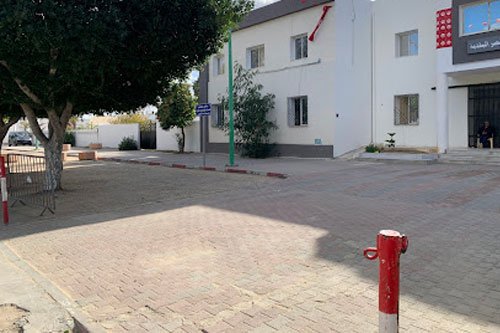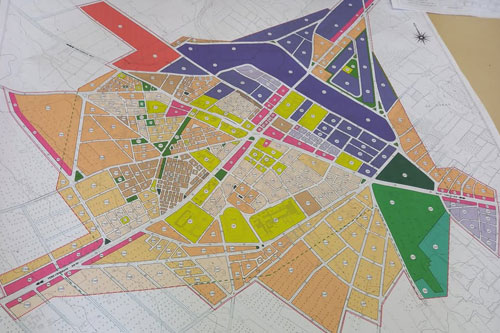Access to Information
What information is accessible?
Any recorded information regardless of its date or form (written, audio, visual) or its medium (paper or electronic) that is produced or obtained by structures subject to the provisions of the organic law on the right of access to information in the framework of their activities.
How to access information?
Access to information is either by consulting it on the website of the concerned structure, if it publishes it automatically, or by submitting an access to information request to the concerned structure if the requested information is not published.
What are the penalties guaranteeing the right of access to information?
Anyone who intentionally obstructs access to information in structures subject to the provisions of the access to information law is punishable by a fine of five hundred (500) dinars to five thousand (5000) dinars. Anyone who intentionally destroys information illegally or causes another person to do so is punishable by one year imprisonment and a fine of one hundred twenty (120) dinars.
What are the possible formats for accessing information?
When depositing an access request, the requester must specify the format of access to the requested information by asking either:
- Consultation of the information on site, unless it causes damage to it,
- Obtaining a paper copy of the information,
- Obtaining an electronic copy of the information, when possible,
- Or obtaining excerpts from the information.
The submission of an access request is either:
1- Directly to the concerned structure against a receipt that must be delivered,
2- By registered mail with acknowledgment of receipt, fax or email with delivery notification.
Which structures are subject to the law on the right of access to information?
- Presidency of the Republic and its structures
- Presidency of the Government and its structures
- Assembly of People's Representatives and its structures
- Ministries and various structures under supervision inside and outside
- Central Bank
- Public institutions and enterprises and their representations abroad
- Local and regional public structures
- Local communities
- Judicial instances, Supreme Judicial Council, Constitutional Court, Court of Auditors
- Constitutional instances
- Independent higher instances
- Regulatory instances
- Private law persons managing a public service
- Organizations, associations and all structures benefiting from public funding
Are there fees for accessing information?
Everyone has the right to access information free of charge. However, if providing the information requires expenses, the requester is informed in advance of the need to pay fees that should not exceed the actual costs borne by the concerned structure. Cases where access is fee-based are predetermined precisely and exhaustively by a legal text. No fees can be required in the absence of a legal text providing for it. When the law provides that access to specific information or in a specific format is fee-based, payment must be made before obtaining the information.
How to appeal and challenge access denial decisions?
Either by filing an appeal with the head of the concerned structure within a maximum period of twenty (20) days following notification of the decision. The head of the structure must respond as soon as possible without exceeding a maximum period of ten (10) days from the date of filing the appeal. Failure of the head of the structure to respond within this period is considered an implicit refusal. In case of explicit or implicit refusal, the requester can appeal this decision to the Access to Information Authority within a period not exceeding twenty (20) days from the date of receipt of the refusal decision issued by the head of the structure or from the date of implicit refusal. Or directly appeal the decision of the concerned structure to the Access to Information Authority within a period not exceeding twenty (20) days from the date of receipt of the refusal decision.
What is the role of the access to information officer?
The access to information officer is an essential link in the application of the provisions of Organic Law No. 22 of 2016 on the right of access to information. He is appointed by the head of the structure subject to the provisions of the law on the right of access to information, as well as a deputy, by a decision including the main data identifying their identity, rank and career plan. The access to information officer assumes in particular:
- Receiving, processing and responding to access to information requests.
- Liaising between the concerned structure to which he belongs and the Access to Information Authority.
- Developing an action plan to enshrine the right of access to information in coordination with the main managers of the concerned structure, including clear objectives and a schedule defining the stages, deadlines and role of each stakeholder, under the supervision of the head of the concerned structure. The main managers of the concerned structure must facilitate the task of the access officer, coordinate with him and provide him with the data necessary for the preparation of said action plan. The access officer prepares a quarterly report that he submits within fifteen (15) days following each quarter to the head of the concerned structure.
- Preparing an annual report on access to information during the first month of the year following the activity year and submitting it, after approval by the head of the structure, to the Access to Information Authority. This report includes the proposals and recommendations necessary to further strengthen the enshrinement of the right of access to information, in addition to statistical data on the number of access requests submitted, requests answered, rejected requests, appeal requests and responses to them and their deadlines, in addition to measures taken in the field of information provision on the initiative of the concerned structure, document management and staff training.
- Monitoring the implementation of the action plan and updating it under the supervision of the head of the concerned structure.
What are the response times for an access to information request?
The concerned structure must respond to any access request within a maximum period of twenty (20) days from the date of receipt of the request or its regularization. If the access request concerns consultation of the information on site, the concerned structure must respond within a maximum period of ten (10) days from the date of receipt of the request or its regularization. If the response is a refusal, the refusal decision must be in writing and justified, specifying the deadlines and methods of appeal and the competent structures to hear it in accordance with the provisions of Articles 30 and 31 of Organic Law No. 22 of 2016 dated March 24, 2016 on the right of access to information.
- If the access to information request has an impact on a person's life or freedom, the concerned structure must ensure to respond in writing and immediately without exceeding a period of forty-eight (48) hours from the date of submission of the request.
- Failure of the concerned structure to respond to an access request within the legal deadlines provided by the access to information law is considered an implicit refusal which opens the way for the requester to appeal the structure's decision according to the procedures provided in Articles 30 and 31 of said law.
- If the information subject to the request is available from a structure other than the one to which the access request was deposited, the access officer must inform the requester of the lack of competence or refer his request to the concerned structure, within a maximum period of five (5) days from the date of receipt of the request.
- The deadlines mentioned in Article 14 of the law can be extended by ten (10) days with notification to the requester if it involves obtaining or consulting several pieces of information from the same structure.
*In all cases, failure of the concerned structure to respond to an access request within the legal deadlines mentioned above is considered an implicit refusal which can be subject to an appeal or direct challenge before the Access to Information Authority.
Officers in Charge of Access to Information
John Smith
Phone
12345678
Position
General Secretary of the Municipality
Michael Johnson
Phone
87654321
Position
Administrator Advisor General Secretary of the Municipality






